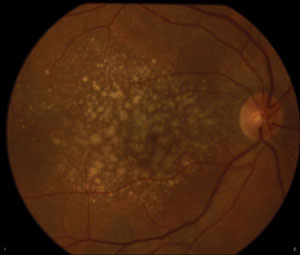A new study suggests taking too much supplementary calcium, especially for older patients, could increase the odds of a diagnosis of age-related macular degeneration (AMD).
 | |
| Soft drusen observed in a patient with early age-related macular degeneration. Image: Jay M. Haynie, OD. |
Researchers from the University of California, San Francisco, (UCSF) evaluated 3,191 study participants older than 40 years for the presence of AMD by fundus photography and interviewed them about dietary supplement intake. The results revealed those who reported consuming more than 800mg of supplementary calcium a day were 85% more likely to be diagnosed with AMD than those who did not report taking a calcium supplement. The researchers note in the study that 800mg is below the recommended total daily intake of calcium for men and women in the United States.
The mean age of those diagnosed with AMD was 67.2, while the mean age for those without AMD was 55.8—leading investigators to speculate that the stronger association in older participants may be due to the longer duration of calcium supplementation or the greater tendency for calcium to cause harm in terms of AMD risk in patients more advanced in age.
While the cross-sectional study, published in JAMA Ophthalmology, did not allow researchers to identify a dose-response association between calcium intake and AMD, “the findings suggest that there is a threshold of calcium supplementation above which there are increased odds of AMD,” lead author Caitlin Kakigi, a UCSF medical student, says.
“Further longitudinal analyses are needed to understand the relationship between the incidence of AMD and varying levels of calcium intake,” Ms. Kakigi says. “However, this study supports the general idea that physicians should refrain from recommending high levels of calcium to patients who are at high risk for AMD and otherwise have no medical indication for calcium supplementation.”
Kakigi CL, Singh K, Wang SY, et al. Self-reported calcium supplementation and age-related macular degeneration. JAMA Ophthalmol. 2015 Apr 9. [Epub ahead of print].
